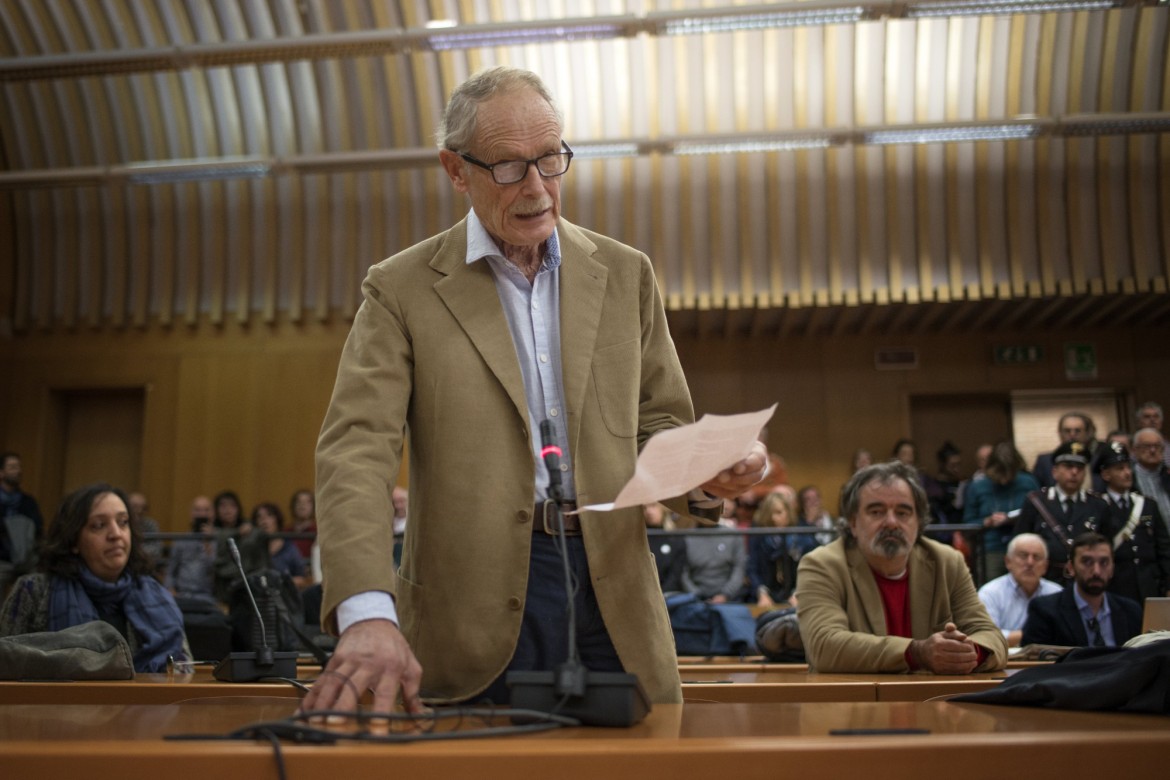The contrary words of the writer Erri De Luca

In January, the Italian writer Erri De Luca was charged with incitement for an interview he gave in 2013 to Huffington Post Italy. De Luca stated his support for the “NoTav” movement, which for 20 years has been protesting the construction of a high-speed railway line — the TAV — between Turin, Italy, and Lyon, France.
In the interview, De Luca said the TAV “should be sabotaged. Shears are useful. They are needed to cut the fences” around the building site.
For his words, an Italian prosecutor sought an eight-month jail term for incitement, a criminal offense seldom used in Italy. It was written into the Criminal Law under Benito Mussolini in the 1930s and remains on the books. A campaign supporting freedom of speech and Erri De Luca is on Twitter: @erriders and #iostoconerri.
Here is De Luca’s last speech in the courtroom just before his sentence. A couple of hours later, the Turin judge cleared the writer of the charge.
Erri De Luca, speech in the Turin Courtroom, Oct. 19, 2015
I would be present here in this courtroom even if I were not the writer indicted for incitement.
Beyond my insignificant personal case, I consider the indictment here in question an experiment, an attempt to silence contrary words.
So I consider this courtroom an outpost overlooking the immediate present of our country. I work as a writer, and I consider myself the victim of a will to censorship.
I am indicted for an article in the criminal code that dates back to 1930 and that dark period of Italian history. I consider that article passed again by the subsequent drafting of the Constitution of the Italian Republic.
I am in this courtroom to know if that text is still in force and prevailing or if the court shall have the power to suspend and invalidate Article 21 of the Constitution.
I prevented my lawyers from arguing for the unconstitutionality of my charge. If successful, he would have stopped this process and transferred these proceedings to the halls of a Constitutional Court overloaded with work, where a ruling would take years. If admitted, the application would have bypassed this courtroom and wasted this precious moment.
We believe that what is constitutional has to be decided here, in public places such as this, as well as in a police station, in a classroom, in a prison, in a hospital, at work, on the borders crossed by asylum seekers.
What is constitutional is measured at the ground floor of our society.
Extenuating circumstances are inapplicable to my case. If what I said is a crime, I repeat it and I keep saying it.
I am indicted for having used the word “sabotage,” a word I consider noble and democratic.
Noble because it was pronounced and practiced by valiant figures like Gandhi and Mandela, with huge political results.
Democratic because its origins are in the labor movement and its struggles: striking to sabotage production.
I defend the legitimate use of the word “sabotage” in its most effective and wide meaning. I am willing to be criminally convicted for its use, but I will not be convicted as a means of censorship or to restrict free speech in Italy.
I said: “Shears are useful.” For what? How could one sabotage a colossal and harmful project with only shears? There were no other items of insidious hardware mentioned in my phone conversation [with a journalist].
Therefore, you are incriminating verbal support of a symbolic action. But I won’t get into my lawyers’ field of expertise.
I conclude by re-affirming my belief that the so-called high-speed railway line in the Susa Valley should be hindered, obstructed and impeded, then sabotaged in self-defense for the health of the soil, air and water of a threatened community.
My words are still contrary. I await to hear whether this is a criminal offense.
Text taken in Italian from the Erri De Luca Foundation.
Originally published at on
